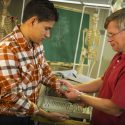Kemnitz to step down as Primate Center director
Joseph W. Kemnitz, who has led Wisconsin’s National Primate Research Center (WNPRC) for more than a decade, announced this week (Jan. 9) that he plans to step down from his position as director of the center and return to the faculty at the end of 2009.
An expert on the physiology of aging, Kemnitz, who also holds an appointment as a professor of physiology in the School of Medicine and Public Health, assumed leadership of the center in 1996 when he was named interim director. Former Graduate School Dean Virginia Hinshaw named him the fourth director of the center in 1999.
WNPRC is one of eight federally supported National Primate Research Centers. A critical core facility, the center is used by more than 250 scientists who study primate biology in the interest of human and animal health. It is part of the UW–Madison Graduate School and has strong research and teaching links to the School of Medicine and Public Health, the College of Letters and Science, the College of Agricultural and Life Sciences and the School of Veterinary Medicine.
“We’re grateful to Dr. Kemnitz for the leadership that he’s provided for our primate center for so many years,” says Graduate School Dean Martin Cadwallader. “Running such centers is no small thing. It is a multifaceted and complex environment, and we’re fortunate that the center is on a sound footing and well positioned for the future.”
Kemnitz oversaw a growing research enterprise, with annual federal support awarded to center scientists climbing from $11 million at the beginning of his tenure to more than $15.5 million today. The most visible and far-reaching research achievement on Kemnitz’s watch was the work of Jamie Thomson, who in the 1990s isolated embryonic stem cells from two non-human primate species at the center, setting the stage for the world’s first successful isolation and culturing of human embryonic stem cells.
Kemnitz plans to remain active in center activities and programs, including helping to cement relationships with the UW–Madison’s Institute for Clinical and Translational Research and the International Primate Plan through the Institute of Laboratory Animal Research, among other activities. He will also continue his own research program.
According to Cadwallader, a national search for a successor will begin immediately with the goal of identifying and engaging a new director by the end of the year.


